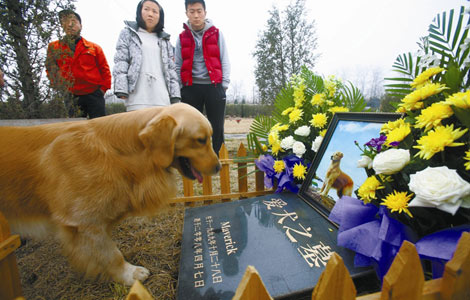Plants to dispose of dead pets
Updated: 2011-12-19 09:22
By Cao Yin (China Daily)
|
|||||||||
|
 A man (right) and his dog Maimai at the grave side of Maverick, who was the father of Maimai, at CKC Pet Cemetery in Beijing's Tongzhou district on March 30, 2010. Such graves are too expensive for many pet owners. [Shi Huili / for China Daily] |
BEIJING - When his beloved dog Xiaoqi died earlier this year, Liu Jiang did not know what to do with the body, so he dug a 50-centimeter grave for his pet beneath a tree in his community.
"I couldn't find any better solution for my pet," said the 29-year-old living in the Shijingshan district of the capital.
"I really miss him and didn't want him to sleep far from me," he added.
Liu is not the only resident who has buried their pet in this way.
However, Wang Bin, director of the veterinarian management department at the Beijing municipal bureau of agriculture, said that this could be a health risk.
"Since how to cope with dead pets is still a blank in the relevant regulations, few pet hospitals take responsibility for animals' funerals and most residents just throw their dead pets away like daily garbage. But the bacteria on dead animals can pollute the soil, which might be harmful to people's health," he said.
More than 60,000 registered dogs die in the city each year, according to statistics from the bureau, but the total number of dogs that die each year is more than that, because at least 1 million dogs haven't been registered, and there are other animals besides dogs that are kept as pets, Wang said.
To try and limit the practice of people burying their pets in communities, the municipal government is establishing nine disposal plants next year that will be able to dispose of 12 tons of dead animals a day.
"Not only pets in the central city will be sent to the plants, but also the dead animals on rural farms," he said. "The bodies will be disposed of using an advanced technology that does no harm to the environment and people's health."
The new plants will be located in the outskirts of the capital, such as Shunyi, Changping and Fangshan districts.
But some pet owners are unhappy with the plan as the disposal treatment used at the plants chemically dissolves the bodies, which means they will not be given their pet's ashes.
"I would want to take my pet's ashes home. After all, it's a big comfort for most pet owners," said 24-year-old He Yimeng, a resident in Xicheng district, who buried a cat last year.
Liu said that he would only use the disposal plants if they provided the ashes, but if they did he would be willing to pay a reasonable fee.
Both He and Liu considered using a private cremation company when their pets died, but both found the service too expensive.
Chen Shaochun, 42, manager of Baifu Pet Heaven Burial Center, said a cremation is 400 yuan ($60) for each pet, while a burial is about 1,200 yuan.
Up to now, his company has buried more than 3,000 pets since it was established in 2005.
At another pet crematorium, Boaibanlu in Changping district, an employee surnamed Wang said they cremate dead pets in line with their weight.
"Pets over 20 kilograms cost 800 yuan and the lighter ones 500 yuan," she said, adding the all-round service, including the cremation, cemetery and some flowers, is 1,850 yuan.
China Daily











